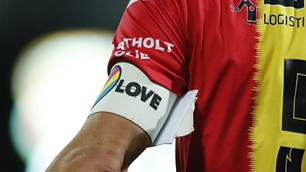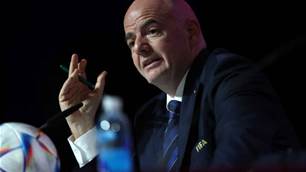Morocco made history in 2023 becoming the first Arab, and North African nation to ever qualify for the Women's World Cup. In the second Group H matchday, Reynald Pedros' side took its already rich legacy to yet another level by defeating Korea Republic to claim a maiden three points at the tournament.
It is no secret that women of an Islamic background have historically faced many obstacles on their journeys to professional sports. Young girls often face cultural and family pressure when they attempt to dip their toes into the world of sports for many different issues.
Some families do not feel comfortable with their girls playing in front of men, others cite a lack of appropriate facilities, while many devout female Muslim footballers who choose to cover themselves for their religion still face the prospect of having to play the sport they love without a hijab, a sign of their modesty and faith.
The garment was banned by FIFA between 2007 and 2014, a direction which was overturned after relentless campaigning. Despite FIFA's change of heart, countries like France still preclude young Muslim girls from participating while maintaining their values because of similar laws.
In the second Group H matchday, history was made when Morocco's Nouhaila Benzina became the first player to play a FIFA Women's World Cup match with a hijab. The center-back's performance had her in conversations for player of the match, and astonishingly, a goal from her teammate Ibtissam Jraïdi, combined with a stubborn defensive showing to ensure that Morocco, the first Arab team to ever participate in the competition, notched its first win on the global stage.
🇲🇦 Morocco are history makers and national heroes.
— COPA90 (@Copa90) July 30, 2023
The first Arab nation to win a game at the Women's World Cup. And Nouhaila Benzina is the first player to wear a hijab while competing at a senior-level Women's World Cup. pic.twitter.com/yBhdir05v2
Benzina's center-back partner Nesryne El Chad spoke to the media after the game sharing her reaction to seeing her country's first-ever FIFA Women's World Cup goal hit the back of the net.
"It is exciting, we are happy, so, so, so happy. We know we have to be focused on the next match but we are so happy! During the match, I couldn’t believe we were winning! I am happy, but I think I am going to realise it later or tomorrow!"
Morocco, like most of the countries in the Arabic world, still maintains many strong cultural, religious, and gender roles which have seen many of those nations almost absent when it comes to backing women's sports consistently and at a high level.
The women's game had been slowly, but steadily growing in Morocco, but when the country hosted the 2022 Women's African Cup of Nations, an unprecedented explosion of interest followed which is rare for women's sports in that part of the world.
Crowds between 40-50 thousand gathered to watch the Atlas Lionesses compete in their home tournament, with reportedly many left disappointed at not being able to get tickets because of the overwhelming demand.
Nysrene El Chad was blown away by what she witnessed during that tournament and is overjoyed about the magnitude of her country's achievements on the global stage can have back home for young girls who could not have imagined becoming professional footballers a few years prior.
"In Arab countries, it is complicated for many girls to play football because it is a ‘sport for men,' but in the last year we have done everything we can to change this and in our country, it is changing which is good.
'The Moroccan people believe in us so it is so joyful for us because we have a whole country believing in us and with that, we can do anything we want.'
Morocco have their first EVER goal at the FIFA Women's World Cup™! 🇲🇦
— Optus Sport (@OptusSport) July 30, 2023
Ibtissam Jraidi with a historic moment for the Atlas Lionesses. Brilliant!
LIVE | https://t.co/BgwncbaNc7#FIFAWWC #OptusSport pic.twitter.com/lKCbpvPnLd
Morocco coach Reynald Pedros praised his players for their recovery after a rough World Cup debut saw them fall to a six-goal loss to Germany. He went out of his way to share how much he believes his squad has improved in quality since the 2022 Women's AFCON, despite keeping the same game style and philosophy.
Pedros praised the Royal Moroccan Football Federation Chairman Fouzi Lekjaa and King Mohamed VI for their support in the infancy stages of what they are planning to be a "long-standing" project.
The coach pointed to multiple parts of the project which he was pleased with such as sports studies, training facilities, development centers, and the Moroccan Women's Championship being professionalised as a league that will allow more players to pursue their passion while affording to make a living.
Pedros echoed El Chad's comments about the importance of representing the next generation of women footballers on the world stage.
"It is a great example, we want to give an example," Morocco's coach responded when he was questioned about his players inspiring the next generation of young female footballers through their achievements.
"When you are young you always have role models, those who love football they have male role models, and what we have in Morocco is to give them female role models. It is true that we were able to unveil Moroccan women’s football thanks to AFCON, which was a fantastic AFCON all across the board from the organisation, the mindset, the results that we were getting, and from the Quarter Finals where I think there were fifty thousand people coming to the stadiums which was absolutely incredible.
"We needed to really breathe life into Moroccan football, to showcase the Moroccan football team, to show that we are in continuous improvement. We will go to the next AFCON, we want to win the next AFCON, we are going to go and try to qualify for the Olympic Games, we want to go to the next World Cup as well and that is what is going to help us rack up that playing time, that visibility, and experience which for me is extremely important."
Morocco's victory over Korea Republic has kept the door ajar in the unlikely situation that it can claim a win against Columbia while hoping Germany also stumbles against Colin Bell's Taegeuk Ladies. Regardless of how the Atlas Lionesses conclude their tournament, they have inspired a new generation of women, not just in Morocco but across the Arab world, inspiring them to think of what were once far-fetched dreams as a potential reality.
Related Articles

WWC newcomers Morocco raring for Germany clash

FIFA blasted for OneLove armband threat













